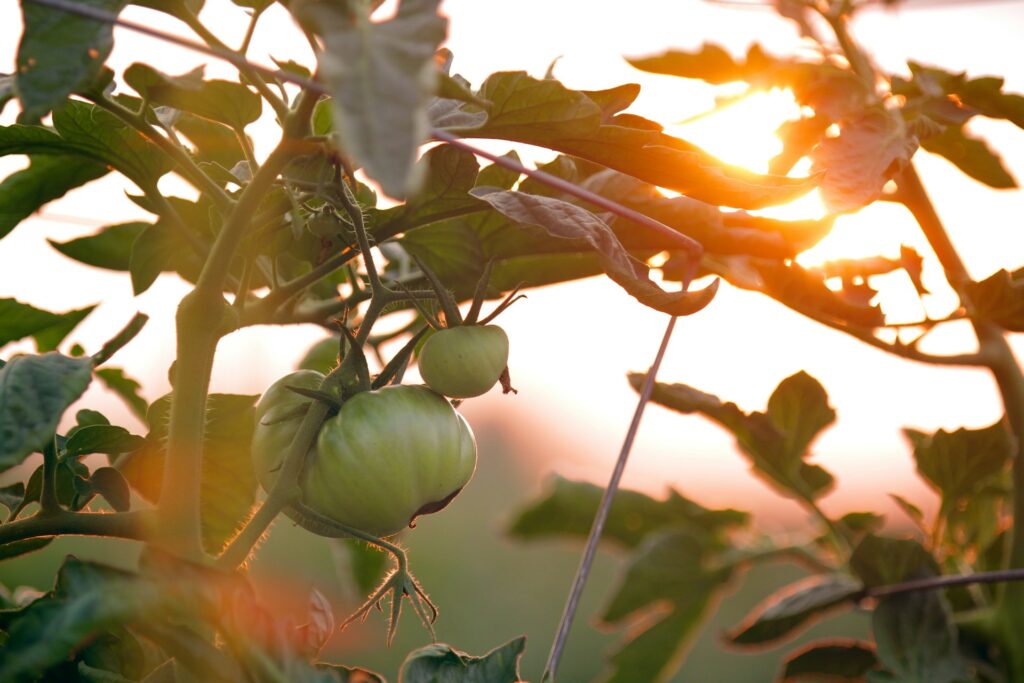I saw him through the gaps in the old wood fence at the community garden. He wore a knee brace on his right leg and used crutches. It’s Friday afternoon, July 19th, and hot for San Francisco—no fog or overcast skies, just 78 degrees and a bright sun. It’s been two days since my last migraine.
The garden is on a hill that faces the gritty part of the Bay, inland of the two big bridges. It overlooks the housing projects on the steep east-facing side of Potrero Hill. It overlooks the warehouses and crumbling docks, the power lines, the I-280, the ugly new condos, the smokestacks, and shipping cranes. Beyond that, in the haze, the brown Oakland Hills are dotted with expensive houses, white specks against the landscape.
At the far end of the garden, my 83-year-old housemate sits on a stump next to a plum tree. He lights his cannabis pipe, takes a deep inhale, and gazes into the shimmering bay. The plum tree is heavy with fruit. There’s a jagged spot of fresh wood where a branch recently broke off. Rotting plums cover the soil and ferment in the sun. The plums on the ground smell like orange juice gone sour.
My housemate exhales and stares into the bay with a blank look of serenity. That look terrifies me. It’s so blank, so close to death. He sits there often, for hours, dreaming. He loves the roses in front of the fence. He loves the heavenly blue morning glories and the grapevine crawling along it. He loves the way the sun dances off the bay. His face is so blank.
The housing projects nearby look like crumbling prison cells: beige, monotone, dirty, with dark, shaded windows covered by security bars. The asphalt area between entrances is strewn with abandoned items: an old TV, a bicycle with no wheels, a stack of traffic cones, a paint bucket; all of it underlined by the faint sounds of a TV.
That’s the view east over the freeway—the people’s view. But the view to the north, that’s a different story. To the north, you can see the Bay Bridge, luxury houses, and downtown San Francisco with its monuments to capital shimmering like gold in the sun.
The people in the projects? They’re a mistake of history. How did they end up here? From their balconies, they can see the view to the north. How did that happen? They have no right to that view. That’s a 3 million dollar view. They have no right to it.
Above the projects and south of the garden are basketball courts, tennis courts, and playgrounds. Further up the hill, where the old water tower used to stand, is a manicured baseball diamond.The air is filled with the steady pulse of kids’ playful calls and screams, always in the background, distant and tinny like a transistor radio.
Eucalyptus and pine trees reach above the playground. They cast that familiar California scent of pine sap baking in the sun, mixed with eucalyptus leaves and dust. This used to be a nice area. But those days are gone. These days, the people here are obsessed with 3 million dollar views. Except for the projects, this whole neighborhood has turned to hell.
I can hear the “whap, whap, whap” of tennis balls and a guy grunting with each hit, punctuated by yells of frustration and occasional victorious shouts. Really? These are only neighborhood tennis courts, not the French Open. This neighborhood has really turned to hell.
I water the nasturtiums in the corner of the garden with a long hose, preferring the “shower” setting on the nozzle. A few weeks ago, the nasturtiums were a carpet of orange and fire-colored flowers. Now, they’re dying off. Any remaining flowers have turned brown.
Next to the nasturtiums, the calla lilies, once ghost white and tall, have wilted and dried. While they were blooming, they looked majestic. It reminded me of my childhood home before the divorce. We had calla lilies there, too. Today, they are just stalks and stubs, like catacombs.
The smell of water on the plants mixes with the scent of damp grass. Small white butterflies dart among the remaining flowers. It feels familiar. It feels safe. Even the sounds of the jerks on the tennis court recede into the background.
My housemate takes another hit of weed and stares into the shimmering void, content with his pipe in hand. Meanwhile, I tend the garden, haunted by everything I’ve done wrong in my life. I think about the pain in my left knee. A car ran me over five years ago. I managed to dodge the worst of the impact, but it still crushed my knee like glass.
I watch the guy on crutches move uphill along the dirt path on the other side of the old wood fence. I watch how he leans forward and propels himself ahead with each step. I remember the pain in my chest after those long days on crutches. I remember the elevator and the cold, miserable hallway at the physical therapist’s office. I remember the blinding light in the operation room. I remember so much fear in the black ink of the middle of the night.
I shake it off. Yes, the smell of water on the plants mingles with the fresh scent of damp grass. It feels familiar. It feels safe. I hardly notice the gate latch click and then open.
The guy with the crutches enters through the gate.
“Hello,” I say. I didn’t recognize him. I thought I knew everyone at the garden.
“Hello,” he says, advancing with his crutches. He was tall and wore casual gym clothes. He looked like a former frat boy now in the early years of middle age.
“I’m Matthew,” he says.
“Nice to meet you,” I say. I pause, “How’d it happen?”
He glances down at his knee and then back up to me.
“Basketball injury,” he says.
“Oh,” I say. “Came down hard after a dunk?”
“That’s it,” he says, humoring me. “Went in for the jam and shattered the glass.”
I know how these guys are. I know how to talk to them.
“Do you have a garden plot here?” I ask.
“Yes,” he says. “With my girlfriend. It’s this one over here.”
He’s friendly. He’s nice. He’s educated. He uses his crutches to hobble to a plot near the rotting fence, a little ways from the nasturtiums. I notice his brace. It’s the same t-scope brace that I wore for years like a scab that wouldn’t fall off.
I pull the hose away and give him some space. I walk to the other side of the garden with an imperceptible limp that only I would notice. I start watering our plants again. The plants need water. I want to give them a good watering today.
A thick fig tree splits the garden in half. It’s at its peak now, thick with leaves and budding fruit. The tree is a cruel joke. The branches droop with green figs that look good enough to eat. They make your mouth water, but they never ripen. They swell up but never soften. Last year, they ended up with tiny bites from rats and squirrels. By October, they fell off the tree like little stones.
“How long have you had your plot?” I call out so Matthew can hear me.
“About a year,” he calls.
“I’m surprised we haven’t run into each other,” I call. “My girlfriend and I have been here about two years.”
“I usually come in the evening,” he calls.
“That explains it,” I call. “I’m usually gone by the afternoon.”
He didn’t respond. I don’t know why I’m talking. I hate talking. Maybe it’s because of the knee brace. I guess I think he needs someone to talk to.
I water the bachelor buttons. They were getting tired. But the poppies and dahlias were finally starting to bloom. My girlfriend had a way with flowers. She knew how to care for them. Even now, with things falling apart, she had a knack for making them thrive.
I look at my watch and move to the compost bin, turning it over with a shovel. I smell the rotting vegetation mixed with the warm earth and fresh compost. It’s getting late.
I wonder how long Matthew and his girlfriend will last. A year isn’t long for a garden. A garden can take a lot out of a couple. I wonder if they’ll last.
I turn the compost, the shovel heavy in my hands. Worms squirm and fall from the tip of the shovel back into the compost bin, some of them severed in half. The rhythm of the work is soothing, despite the pain in my knee.
I wonder when my next migraine will hit. I tell myself it will be fine. Things will get better. The garden is just a place. No, the garden is not just a place. The garden is worth it. The work, the sunburn, the waiting—it’s all worth it. It has to be. I glance at my housemate at the other end of the garden, still lost in his world.

